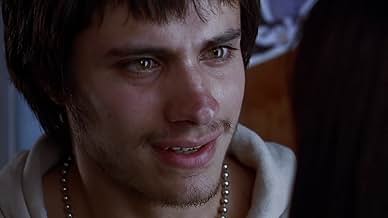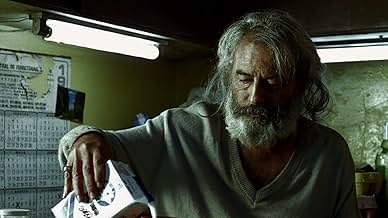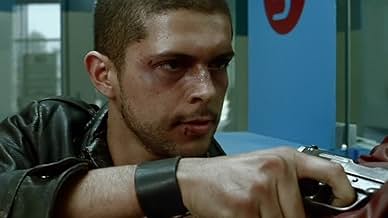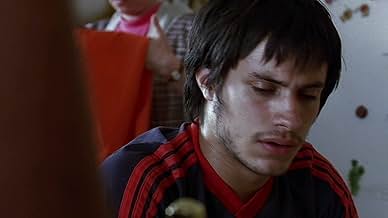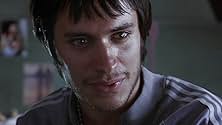Un terribile incidente d'auto porta all'intreccio di tre storie, ognuna caratterizzata da perdite, da rimpianti e dalla cruda realtà, tutto in nome dell'amore.Un terribile incidente d'auto porta all'intreccio di tre storie, ognuna caratterizzata da perdite, da rimpianti e dalla cruda realtà, tutto in nome dell'amore.Un terribile incidente d'auto porta all'intreccio di tre storie, ognuna caratterizzata da perdite, da rimpianti e dalla cruda realtà, tutto in nome dell'amore.
- Regia
- Sceneggiatura
- Star
- Candidato a 1 Oscar
- 55 vittorie e 24 candidature totali
Gael García Bernal
- Octavio
- (as Gael García)
Álvaro Guerrero
- Daniel
- (as Alvaro Guerrero)
Recensioni in evidenza
There is a character in 'Amores perros' who looks like Karl Marx. He is a tramp and an assassin, a good bourgeois who one day, Reggie Perrin-like, abandoned his family, and, un-Reggie Perrin-like, joined the Sandanistas in an effort to create a better world, earning 20 years in prison for his troubles. Walking the streets with a creaky cart and a gaggle of mangy dogs, he was found by the policeman who jailed him, who gave him a dingy place to live, food, and the odd, non-official contract.
El Chivo is the soul of the film, the missing link, both in appearance (a man called 'The Goat', who has rejected the civilities of society and lives a beast-like existence with his dogs, amongst the ruins of civilisation), and narrative function. With intricate structure, 'Amores perros' tells three stories, one of underclass Mexican life, where survival depends on what New Labour calls 'illegal economies' (dog-fighting, bank-robbing etc.), where bright young women are stifled and degraded by thoughtless pregnancies and brutal marriages, where single mothers depend (and usually can't depend) on shiftless sons for subsistence; and this world's mirror opposite, the world of the media, of celebrity, of models and magazine editors, of daytime TV, perfume advertising campaigns and bright apartments. Family life is central here too, although in this case it is torn apart by more pleasanntly bourgeois ailments like ennui and dissatisfaction.
These two stories are mediated by the narrative of El Chivo, the man who left one of these worlds for the other, but who still negotiates the two, through his search for the daughter he left as a toddler, and in his 'job', wiping out businessman. If Mexico is emerging as part of the super-confident globalism of high-capitalism, than El Chivo is the grizzly sore thumb, the ex-Sandinista, the Marx lookalike, the man who said no, the drop-out, the forgotten, the depleted spirit of the Left, happily killing and torturing the servants of the new economic regime.
There is something Biblical about his hirsute ascetism too, presuming to judge the 'Cain and Abel' half-brothers, one an adulterer, the other with a contract out on his sibling, another example of family gone badly wrong. This, the bleak funeral and grave scenes, and Octavia's functional crossing himself every time he passes an icon on the landing, are the sole residual elements of religion in a society once ostentatiously religious.
Except for the director. Like Paul Thomas Anderson in 'Magnolia', although to a less self-conscious degree, Gonzales Inarritu is the God of his film, intricately creating the structure that links his characters and their different environments. These are negative connections, however, which work against the idea of coherent meaning in life - contact usually results in destruction (physical, material, spiritual), or diminishing.
He is also an Old Testament god, punishing those who would get too confident with their future plans or their seemingly inviolable present success - the gains of capitalism are prey to the violent whims of chance: Gonzalez Inarritu doesn't need frogs to shake a rigid society or mindset.
Moral change is linked to physical change - being beaten up, losing a leg, cutting hair. The punning title, with its reference to the dog-eat/fight-dog nature of modern life, and its general unsatisfactoriness, also gives the film its Biblical feel, the idea of Mexico as an asphalt desert, or a rubbish heap, with all these scrawny mutts scavenging the remains.
'Amores perros' shares the sickly, bleached near-monochrome look of many recent crime films, like 'Chopper' or 'Bleeder'. But where the heightened mise-en-scene in those works were expressionistic projections of their protagonists' psychosis, here it's part of a controlling world-view, the universal consciousness that creates, connects and destroys.
The three stories, though connected narratively and symbolically, are mutually distinct - the first is an exhilirating mix of violent gangster film and frustrated romance; the second is like a short story (the screenwriter is a novelist), a figurative plot where movement is through image, symbol and idea, rather than film narrative; the third is a kind of spiritual journey, with an appropriately Biblical (or Wim Wenders-like) openness.
'Amores perros' is not quite as amazing as its admirers claim - it says more about contemporary cinema that a film only has to hold your interest for it to be a masterpiece - but it is consistently enthralling, and, despite all the stylistic tics and brutal violence, bracingly humanist.
El Chivo is the soul of the film, the missing link, both in appearance (a man called 'The Goat', who has rejected the civilities of society and lives a beast-like existence with his dogs, amongst the ruins of civilisation), and narrative function. With intricate structure, 'Amores perros' tells three stories, one of underclass Mexican life, where survival depends on what New Labour calls 'illegal economies' (dog-fighting, bank-robbing etc.), where bright young women are stifled and degraded by thoughtless pregnancies and brutal marriages, where single mothers depend (and usually can't depend) on shiftless sons for subsistence; and this world's mirror opposite, the world of the media, of celebrity, of models and magazine editors, of daytime TV, perfume advertising campaigns and bright apartments. Family life is central here too, although in this case it is torn apart by more pleasanntly bourgeois ailments like ennui and dissatisfaction.
These two stories are mediated by the narrative of El Chivo, the man who left one of these worlds for the other, but who still negotiates the two, through his search for the daughter he left as a toddler, and in his 'job', wiping out businessman. If Mexico is emerging as part of the super-confident globalism of high-capitalism, than El Chivo is the grizzly sore thumb, the ex-Sandinista, the Marx lookalike, the man who said no, the drop-out, the forgotten, the depleted spirit of the Left, happily killing and torturing the servants of the new economic regime.
There is something Biblical about his hirsute ascetism too, presuming to judge the 'Cain and Abel' half-brothers, one an adulterer, the other with a contract out on his sibling, another example of family gone badly wrong. This, the bleak funeral and grave scenes, and Octavia's functional crossing himself every time he passes an icon on the landing, are the sole residual elements of religion in a society once ostentatiously religious.
Except for the director. Like Paul Thomas Anderson in 'Magnolia', although to a less self-conscious degree, Gonzales Inarritu is the God of his film, intricately creating the structure that links his characters and their different environments. These are negative connections, however, which work against the idea of coherent meaning in life - contact usually results in destruction (physical, material, spiritual), or diminishing.
He is also an Old Testament god, punishing those who would get too confident with their future plans or their seemingly inviolable present success - the gains of capitalism are prey to the violent whims of chance: Gonzalez Inarritu doesn't need frogs to shake a rigid society or mindset.
Moral change is linked to physical change - being beaten up, losing a leg, cutting hair. The punning title, with its reference to the dog-eat/fight-dog nature of modern life, and its general unsatisfactoriness, also gives the film its Biblical feel, the idea of Mexico as an asphalt desert, or a rubbish heap, with all these scrawny mutts scavenging the remains.
'Amores perros' shares the sickly, bleached near-monochrome look of many recent crime films, like 'Chopper' or 'Bleeder'. But where the heightened mise-en-scene in those works were expressionistic projections of their protagonists' psychosis, here it's part of a controlling world-view, the universal consciousness that creates, connects and destroys.
The three stories, though connected narratively and symbolically, are mutually distinct - the first is an exhilirating mix of violent gangster film and frustrated romance; the second is like a short story (the screenwriter is a novelist), a figurative plot where movement is through image, symbol and idea, rather than film narrative; the third is a kind of spiritual journey, with an appropriately Biblical (or Wim Wenders-like) openness.
'Amores perros' is not quite as amazing as its admirers claim - it says more about contemporary cinema that a film only has to hold your interest for it to be a masterpiece - but it is consistently enthralling, and, despite all the stylistic tics and brutal violence, bracingly humanist.
This Mexican movie was surprisingly good. I confess the sin of prejudice concerning Mexican cinema, this being maybe the second Mexican film I have ever seen, but here my sins are punished. This is the work of a director of big talent. Hopefully, he will not be spoiled by the success.
Three different stories in today's Mexico mix with very few common elements. The characters belong to different social categories, and nothing connects them at first sight, excepting the feeling of un-happiness, and - yes - dogs. Dogs play an important role in all three stories. One more warning - there is a lot of cruelty including dog fights - this film is certainly not for sensitive animal lovers.
Directing is excellent, the stories are human and complex and despite their melodramatic or sometimes tragic outcome, they still leave you with a shade of hope - maybe because the humanity that the author uses to create his characters. There are so many memorable scenes, that I would commit another sin to pick any and describe it here - just rent, or go to watch this movie in the theater - it is worth all 150 or so minutes you will spend. 9/10 on my personal scale.
Three different stories in today's Mexico mix with very few common elements. The characters belong to different social categories, and nothing connects them at first sight, excepting the feeling of un-happiness, and - yes - dogs. Dogs play an important role in all three stories. One more warning - there is a lot of cruelty including dog fights - this film is certainly not for sensitive animal lovers.
Directing is excellent, the stories are human and complex and despite their melodramatic or sometimes tragic outcome, they still leave you with a shade of hope - maybe because the humanity that the author uses to create his characters. There are so many memorable scenes, that I would commit another sin to pick any and describe it here - just rent, or go to watch this movie in the theater - it is worth all 150 or so minutes you will spend. 9/10 on my personal scale.
A young man gets into the world of illegal dog fighting in order to get enough money together to be able to run away with his brother's wife, but in the meantime he starts tension with another dog owner. A beautiful young model signs a lucrative contract with a perfume company and moves into her new flat with her lover only for her tragedy to strike and her dog to go missing. Finally an ex-convict and guerrilla mourns the wife he left decades ago and longs to meet the daughter who thinks he is dead but is also contracted to kill a businessman. These three lives come together in a car crash that acts as a catalyst in changing their lives.
After seeing 21 Grams I knew that I had to get round to seeing this film. With it's appearance on TV (BBC4 showing itself to really be a 'place to think' and a wonderful channel to have) I took the opportunity to watch it, expecting a film that would match the good things I had heard about it. >From the opening car chase that results in the crash that the film spirals outwards from like debris, through for most of the first hour, I was hooked the pace was great and the story gripping. It was violent, exciting and yet had a human element to it as well. However the second story knocked the wind out of it for a moment, and seemed to lack the emotion of the first. It was based around an urban myth of sorts and wasn't as good even if it did pick up towards the end.
The third story saw it return to a much more involving story of pain and the grinding out of life (as in 'getting by'). Maybe it was the rich lifestyles of the characters in story two that stopped me caring as much I don't know but I know that the contrast between one & two made it more obvious how much the pace had dropped especially when we are left wanted to know what happened to the characters we had spent an hour getting to care about. Anyway, the third story is a satisfying ending to the film and drew me back in emotionally where the second story had cut me off by it's abrupt start. Story two finishes before story three begins, and therefore it was easier to move on.
I think the problem with this film for me was not the fact that three stories were intermingled but that I didn't think they were actually mixed well the way the film moves away from characters before concluding their section (eg Octavia), the way the stories are actually quite separate from one another, these things and other I felt weakened the films although each story was strong on it's own I just felt that story 2 was such a change to the film that it hurt it.
However, as a film debut this is an amazing piece of work and is relentlessly impressive. From the opening car chase to the dog fights to the silent pain of the model looking out where her image once hung in all these different moments I thought he did a great job and visually the film was never dull once no matter if it was set in a penthouse flat or a basement of an old building with the blood of dead dogs. And while we're on the subject, at the time of release I heard critics say they walked out of the film, refusing to watch cruelty to animals even being simulated. I can see their point but also think that they missed the fact that the animals in the film are mostly loved (even if they mostly die!) however it is love and compassion for other humans that the film shows the characters having difficulty with, and this is where the emotional impact of the film is not in simulated dogfights, albeit very well simulated dogfights that are hard to hear even if they are mostly unseen.
The cast were all natural but I always find it hard to judge performances when they are not in English. Having said that, there were no bad performances in the whole thing even if some have better material to work with than others. Of course I still think this is a director's film and the cast often take second place to the style and the feel of the film.
Overall I really enjoyed this film but don't believe it deserves to be considered one of the 'best films ever made'! The opening hour is superb and it's pace is relentless (even in more sensitive moments) but the sudden stop the film makes when it changes to story two is too much to stand and really caused the film to stutter for me. It gets better and is fully back on track for story three but there are problems running all through the narrative. Even though it has a lower rating on IMDb at time of writing, I'd still say that 21 Grams offer this same fragmented style but with a much more satisfying narrative. Regardless of my nit picking I still think this is a powerful film that makes 150 minutes fly by with a huge amount of style from the first-time director, even if it does not live up to the endlessly gushing praise lavished upon it by many viewers.
After seeing 21 Grams I knew that I had to get round to seeing this film. With it's appearance on TV (BBC4 showing itself to really be a 'place to think' and a wonderful channel to have) I took the opportunity to watch it, expecting a film that would match the good things I had heard about it. >From the opening car chase that results in the crash that the film spirals outwards from like debris, through for most of the first hour, I was hooked the pace was great and the story gripping. It was violent, exciting and yet had a human element to it as well. However the second story knocked the wind out of it for a moment, and seemed to lack the emotion of the first. It was based around an urban myth of sorts and wasn't as good even if it did pick up towards the end.
The third story saw it return to a much more involving story of pain and the grinding out of life (as in 'getting by'). Maybe it was the rich lifestyles of the characters in story two that stopped me caring as much I don't know but I know that the contrast between one & two made it more obvious how much the pace had dropped especially when we are left wanted to know what happened to the characters we had spent an hour getting to care about. Anyway, the third story is a satisfying ending to the film and drew me back in emotionally where the second story had cut me off by it's abrupt start. Story two finishes before story three begins, and therefore it was easier to move on.
I think the problem with this film for me was not the fact that three stories were intermingled but that I didn't think they were actually mixed well the way the film moves away from characters before concluding their section (eg Octavia), the way the stories are actually quite separate from one another, these things and other I felt weakened the films although each story was strong on it's own I just felt that story 2 was such a change to the film that it hurt it.
However, as a film debut this is an amazing piece of work and is relentlessly impressive. From the opening car chase to the dog fights to the silent pain of the model looking out where her image once hung in all these different moments I thought he did a great job and visually the film was never dull once no matter if it was set in a penthouse flat or a basement of an old building with the blood of dead dogs. And while we're on the subject, at the time of release I heard critics say they walked out of the film, refusing to watch cruelty to animals even being simulated. I can see their point but also think that they missed the fact that the animals in the film are mostly loved (even if they mostly die!) however it is love and compassion for other humans that the film shows the characters having difficulty with, and this is where the emotional impact of the film is not in simulated dogfights, albeit very well simulated dogfights that are hard to hear even if they are mostly unseen.
The cast were all natural but I always find it hard to judge performances when they are not in English. Having said that, there were no bad performances in the whole thing even if some have better material to work with than others. Of course I still think this is a director's film and the cast often take second place to the style and the feel of the film.
Overall I really enjoyed this film but don't believe it deserves to be considered one of the 'best films ever made'! The opening hour is superb and it's pace is relentless (even in more sensitive moments) but the sudden stop the film makes when it changes to story two is too much to stand and really caused the film to stutter for me. It gets better and is fully back on track for story three but there are problems running all through the narrative. Even though it has a lower rating on IMDb at time of writing, I'd still say that 21 Grams offer this same fragmented style but with a much more satisfying narrative. Regardless of my nit picking I still think this is a powerful film that makes 150 minutes fly by with a huge amount of style from the first-time director, even if it does not live up to the endlessly gushing praise lavished upon it by many viewers.
Three stories of life in Mexico, all loosely linked by one core element, dogs.
What a powerful and shocking movie this is, Amores perros is one of those films that truly lives with you.
I can't admit to seeing a huge amount of Mexican films, but I've certainly seen Mexico, Mexico City in particular as the setting for many crime documentaries, it is clearly one busy, but very dangerous City.
Intensely thought provoking and engrossing in equal measure, this film hits hard, full of violence, and I don't know what this says about me, but the violence between people was standard fair, the violence involving the dogs was hard to watch.
Unsettling in so many ways, people making bad choices, which of course have consequences, it really does show humanity at its worst.
My limited Spanish wasn't good enough to understand most, but I didn't mind the subtitles at all, sometimes it was a little hard to read them as the movie had several fast paced scenes.
Emilio Echevarría puts in a terrific performance, but the whole cast are hard to fault.
8/10.
What a powerful and shocking movie this is, Amores perros is one of those films that truly lives with you.
I can't admit to seeing a huge amount of Mexican films, but I've certainly seen Mexico, Mexico City in particular as the setting for many crime documentaries, it is clearly one busy, but very dangerous City.
Intensely thought provoking and engrossing in equal measure, this film hits hard, full of violence, and I don't know what this says about me, but the violence between people was standard fair, the violence involving the dogs was hard to watch.
Unsettling in so many ways, people making bad choices, which of course have consequences, it really does show humanity at its worst.
My limited Spanish wasn't good enough to understand most, but I didn't mind the subtitles at all, sometimes it was a little hard to read them as the movie had several fast paced scenes.
Emilio Echevarría puts in a terrific performance, but the whole cast are hard to fault.
8/10.
Nothing in this film happens for no other reasons than bad decisions taken from the depth of the most negative emotions of our species. It's a portrait of how brilliant we are at just doing harm to ourselves while also having an impact on the lives of the people around us. A very good film, with good storytelling, good acting, good photography and good musics, which is a tribute to human unease.
Lo sapevi?
- QuizFor the scenes where the dogs appeared to be dead or dying, the animals were actually heavily sedated under the careful eye of the Mexican SPCA. Multiple dogs that looked like one dog seen on screen were also used, so that the same dog was not under sedation for more than half an hour and not more than once a day at a time.
- BlooperFor photos taken for the 2nd time in the photo booth, El Chivo is wearing the brother's black sportcoat, yet when he subsequently pastes the photo in the album, the sportcoat appears distinctly burgundy in color.
- Curiosità sui creditiTo Luciano: Because we also are what we have lost. Special Thanks to: "Abba, Pater"
- Versioni alternativeThe following are from the deleted scenes on the DVD:
- An alternate ending where the camera is outside the house where El Chivo was holding the two business partners hostage and two gunshots are heard.
- A comedic and tender scene between Daniel and Valeria which would have come shortly after Valeria returned from the hospital. Valeria wakes up Daniel in the middle of the night to help her get to the bathroom.
- A conversation between Daniel and Valeria in their apartment where Valeria reveals to the audience that she had an abortion.
- A brief scene where Octavio bursts into Susanna's mother's apartment searching for her.
- ConnessioniFeatured in The 58th Annual Golden Globe Awards 2001 (2001)
I più visti
Accedi per valutare e creare un elenco di titoli salvati per ottenere consigli personalizzati
Dettagli
- Data di uscita
- Paese di origine
- Siti ufficiali
- Lingua
- Celebre anche come
- Amores Perros
- Luoghi delle riprese
- Aziende produttrici
- Vedi altri crediti dell’azienda su IMDbPro
Botteghino
- Budget
- 2.000.000 USD (previsto)
- Lordo Stati Uniti e Canada
- 5.408.467 USD
- Fine settimana di apertura Stati Uniti e Canada
- 61.047 USD
- 1 apr 2001
- Lordo in tutto il mondo
- 20.908.467 USD
- Tempo di esecuzione2 ore 34 minuti
- Colore
- Mix di suoni
- Proporzioni
- 1.85 : 1
Contribuisci a questa pagina
Suggerisci una modifica o aggiungi i contenuti mancanti




